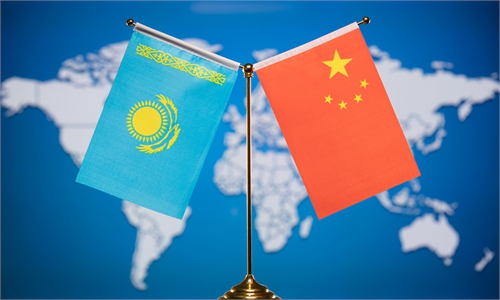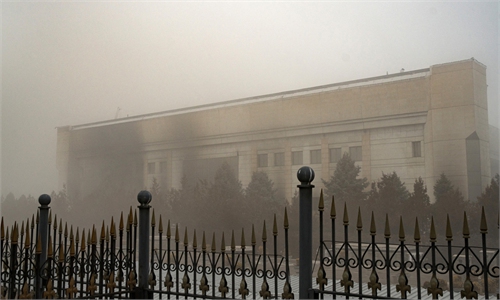
Residents are dancing to welcome the new year in Urumqi, capital city of Northwest China's Xinjiang Uygur Autonomous Region on December 31, 2021. Photo: VCG
Kazakhstan's National Security Committee confirmed on Monday the connection between the recent unrest in the country and some extremist forces. According to the committee, the head of one extremist cell appeared to be a foreign citizen related to foreign terrorist groups.The large-scale riots in Kazakhstan started as demonstrations resulting from gas price increase. Then some extremist and terrorist groups, including those trained abroad, took advantage of such demonstrations, gradually turning them into riots.
The Kazakh government claims the number of terrorists involved in the riots is probably around 20,000. Judging from the events, including the seizure of civilian airliners and the use of force, I think the number is smaller, and the key players may amount to just a few thousand.
Some worry that extremism in Kazakhstan, a country that borders Northwest China's Xinjiang Uygur Autonomous Region, may spread. Just like China's Xinjiang years ago, the Central Asian country is a victim of the gradual infiltration of global extremism and terrorism. However, peace and stability have long been restored in Xinjiang thanks to the Chinese government's efforts to curb the spread of extremism in the region. This might provide countries like Kazakhstan with some valuable experience.
Economic development is one of the most important factors in countering extremist ideas. The direct cause of the recent chaos in Kazakhstan is the rocketing gas price. As the economy develops and people's livelihoods improve, citizens will be more able to endure an emergence if it occurs.
Take Xinjiang. The economic development in Xinjiang is confined by the natural environment and therefore lags behind that of some coastal and mainland areas. The Chinese central government has invested heavily in energy and measures toward China's western development, including the "pairing assistance" program. These concrete measures have boosted the economic development of Xinjiang.
However, this is far from being sufficient. After the reform and opening-up, the spread of "Pan-Turkism," "Pan-Islamism" and extremism under the banner of religion affected some people in Xinjiang. To deal with these people, we should first classify them into two groups. One group includes those who have been influenced by extremist ideas but have not yet carried out any terrorist activities. The other group actually engages in terrorist attacks in various parts of Xinjiang under the influence of extremism.
For the first group of people, China has been focusing on helping them to get rid of extremist ideas through various forms, including education and the "fanghuiju" campaign, in which civil servants are dispatched to grass-roots communities to offer help to people of various ethnic groups. For the second group, China has been making great efforts to crack down on terrorist activities that threaten people's lives and property.
In addition, it is necessary to educate the general public about the threats and dangers of extremism and terrorism so that people can stay alert. Education about national unity will also be helpful, especially in countries with multiple ethnic groups.
In short, extremism and terrorism cannot be solved in one single way due to the complex social, historical, religious, and ethnic backgrounds of extremism. It is because of the comprehensive governance through multiple means that Xinjiang has been able to succeed in the fight against extremism and terrorism.
During a phone call with Kazakh Deputy Prime Minister and Foreign Minister Mukhtar Tileuberdi on Monday, Chinese State Councilor and Foreign Minister Wang Yi proposed that China is willing to strengthen cooperation with Kazakhstan in law enforcement and security sectors. Since some of the rioters in Kazakhstan are trained by some foreign extremist organizations, China can help Kazakhstan by exchanging information or conducting legal cooperation such as judicial extradition.
While the Collective Security Treaty Organization (CSTO) has sent peacekeepers to the Central Asian country in turmoil, the Shanghai Cooperation Organisation (SCO) is unlikely to do the same. That is because the SCO holds a different perspective from the CSTO on combating the "three evil forces" - the evil forces of terrorism, extremism, and separatism - to maintain security. In the future, the SCO will possibly focus on the joint law enforcement of its member states.
The author is a research fellow of the China Institutes of Contemporary International Relations. opinion@globaltimes.com.cn



